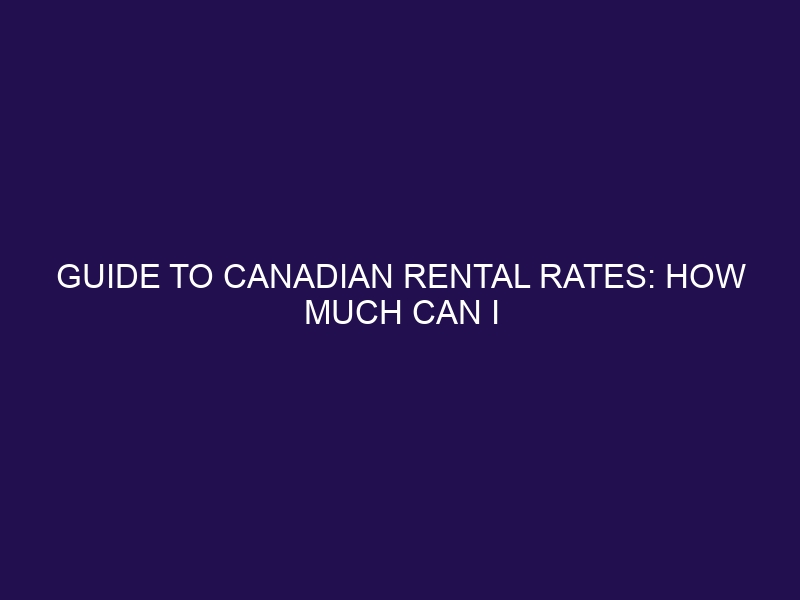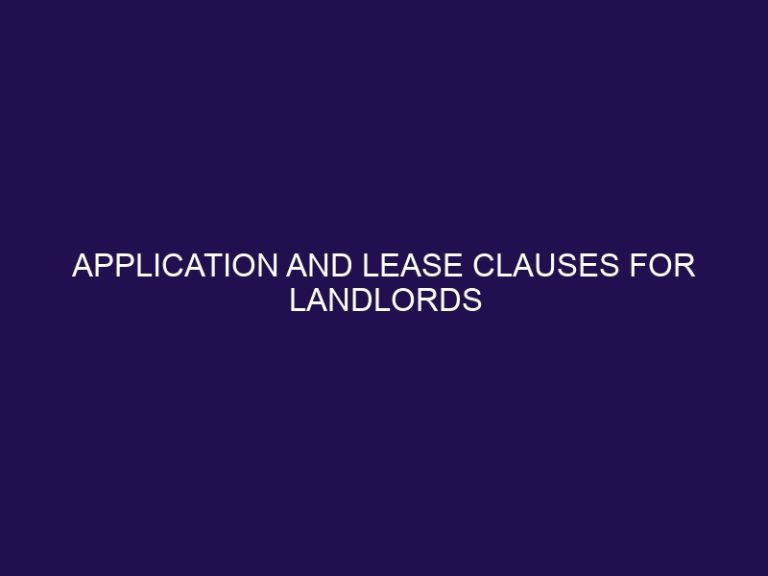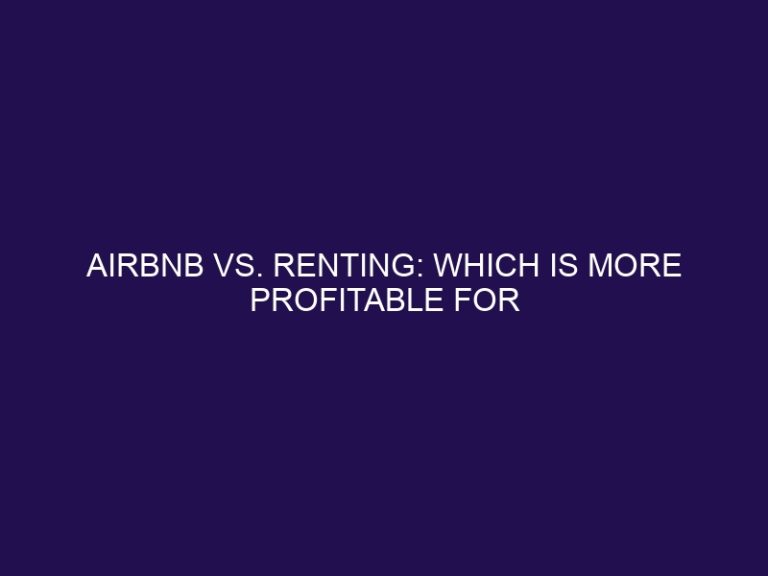Guide to Canadian Rental Rates: How Much Can I Rent My House for?
Rental rates refer to the amount of money a landlord or property owner charges to a tenant in exchange for the use of their property. In Canada, rental rates vary depending on various factors, such as location, property type, amenities, and economic conditions. These rates can have a significant impact on both landlords and tenants, as they affect the cost of living and return on investment.
Factors such as location, property type, size, and condition can significantly affect rental rates in Canada. For example, properties located in major cities or desirable neighborhoods tend to have higher rental rates due to the high demand for housing. Similarly, larger properties with more bedrooms and desirable amenities, such as parking or in-unit laundry, may also command higher rental rates.
At present, the average rental rate for a one-bedroom apartment in Canada is around $1,200 per month, while a two-bedroom apartment can cost an average of $1,400 per month. However, rental rates can vary greatly depending on the specific location and property type.
To determine the rental rate for your property, research similar properties in your area and consider the above-mentioned factors. It may also be helpful to consult with a real estate agent who is knowledgeable about the rental market in your area.
When setting rental rates, landlords must also consider the legalities surrounding rental rates in Canada. Rent control laws in certain provinces may limit the amount landlords can increase rental rates. Additionally, landlords must comply with human rights laws that prohibit discrimination in setting rental rates. It is also essential to have a written tenancy agreement that outlines the terms and conditions of the rental agreement.
Landlords can increase rental rates by making improvements to the property, offering additional services or amenities, and considering market trends. It is essential to be mindful of market conditions and to increase rates gradually to avoid losing tenants. By understanding the factors that affect rental rates and staying informed about the rental market, landlords can maximize their rental income while providing a fair and competitive rate for tenants.
Key Takeaways:
What Are Rental Rates?
Rental rates are the fees charged for the use of a property. These rates can differ depending on the location, size of the property, available amenities, and demand in the market. Other factors that can affect rental rates include the condition of the property and nearby facilities.
What Factors Affect Rental Rates in Canada?
When determining rental rates for your property in Canada, there are various factors that come into play. These factors can greatly influence the amount you can charge for rent and ultimately impact your return on investment. In this section, we will discuss the key elements that can affect rental rates in Canada. From the location and type of property, to the demand and supply in the market, understanding these factors can help you make informed decisions when setting your rental rates.
Location
Location plays a major role in determining rental rates in Canada, as it affects demand and amenities. For example, urban areas such as Toronto have higher rates compared to smaller towns. In Vancouver, prices are also influenced by factors such as proximity to public transit and scenic views.
Property Type
| Property Type | Description |
| Apartment | Self-contained unit in a building |
| Condo | Unit in a larger complex with shared amenities |
| House | Detached dwelling with private outdoor space |
| Townhouse | Multi-level property with shared walls |
A friend upgraded from a condo to a townhouse due to the desire for more space and a private garden.
Size and Number of Bedrooms
| Size and Number of Bedrooms | |
| Factors | Impact on Rental Rates |
| Large Size and More Bedrooms | Higher Rental Rates |
| Small Size and Fewer Bedrooms | Likely Lower Rental Rates |
Amenities and Features
- Modern Amenities: In-demand features such as smart home technology and energy-efficient appliances.
- Recreational Facilities: Gyms, pools, and community spaces that enhance the value of the property.
- Convenience: On-site laundry, parking, and proximity to public transportation make living easier.
- Safety: Security systems, gated access, and well-lit areas provide peace of mind.
Did you know? Properties with sought-after amenities and features often command higher rental rates.
Condition of the Property
The condition of the property greatly affects rental rates. Keeping the interior well-maintained, incorporating modern amenities, and ensuring functional infrastructure can justify higher rates. Regular maintenance, upgrades, and aesthetic improvements can increase the value of the property, potentially resulting in higher rent. Furthermore, professional property management can assist in maintaining and enhancing the condition of the property.
Demand and Supply
Demand and supply are crucial factors in determining rental rates, with high demand in urban areas leading to increased rates. Conversely, in certain neighborhoods where there is an oversupply, rental rates may be driven down. It is essential for landlords to understand these dynamics in order to set competitive and attractive rental prices.
Economic Factors
Economic factors such as inflation, job market, and GDP have a significant impact on rental rates. For example, during economic booms, there is typically an increase in rental demand, leading to an increase in rates. However, during recessions, there may be a decrease in demand, which can stabilize or even decrease rental rates.
What Is the Average Rental Rate in Canada?
The average rental rate in Canada varies by province and city, with factors like location, property type, and amenities influencing prices. For instance, in Toronto, the average monthly rent for a one-bedroom apartment is around $2,300, whereas in Montreal, it’s approximately $1,400.
How Can I Determine the Rental Rate for My Property?
As a homeowner looking to rent out your property, one of the first questions you may have is: how much can I realistically charge for rent? In this section, we will discuss the various factors that contribute to determining the rental rate for your property. From researching similar properties in your area to consulting with a real estate agent, we will guide you through the process of setting a competitive and profitable rental rate for your house.
Research Similar Properties in Your Area
- Use online real estate platforms to research similar properties in your area with comparable size, amenities, and location.
- Consult with local real estate agents to gather information on recent rental rates of properties that are similar to yours.
- Take into consideration factors such as the property’s condition and demand/supply dynamics to make an accurate comparison.
Consider the Above Mentioned Factors
When setting rental rates for your property in Canada, it’s essential to take into account the aforementioned factors, including:
- Location
- Property type
- Size
- Amenities
- Demand
- Economic conditions
- Legal considerations such as rent control laws and tenancy agreements.
Consult with a Real Estate Agent
- Research real estate agents in your area.
- Arrange consultations with shortlisted agents.
- Inquire about their experience and knowledge in rental rates.
- Discuss your property’s specifics and consult with them about their suggested rental rate.
- Review their proposed strategies for maximizing rental income.
What Are the Legalities of Setting Rental Rates in Canada?
As a landlord in Canada, it’s important to understand the legalities surrounding rental rates. This section will cover the key aspects that you need to know in order to set fair and legal rental rates for your property. We’ll discuss the various rent control laws in different provinces, as well as the human rights laws that prohibit discrimination in rental rates. Lastly, we’ll touch on the importance of tenancy agreements and how they can protect both landlords and tenants.
Rent Control Laws
Rent control laws in Canada differ by province, with certain regions implementing strict regulations that limit rent increases. Landlords are required to follow these laws, which aim to provide fair and lawful adjustments to rental rates while also taking into account tenant rights and property upkeep.
Human Rights Laws
Human rights laws in Canada protect tenants from discrimination based on race, gender, religion, disability, and family status. These laws must be followed by landlords when determining rental rates or selecting potential tenants. It is crucial to stay knowledgeable about these laws to ensure that rental practices are fair and lawful.
Tenancy Agreements
- Review the terms and conditions of the tenancy agreement thoroughly.
- Ensure that the agreement includes all essential details such as rent amount, payment frequency, and maintenance responsibilities.
- Seek legal advice if you have any uncertainties about the tenancy agreement terms.
Suggestions: It’s crucial to be well-informed about the specifics of tenancy agreements to avoid potential disputes or misunderstandings with tenants.
How Can I Increase My Rental Rates?
As a landlord in Canada, it is important to keep up with the current rental rates in your area to ensure you are getting the most out of your property. But what if you feel that your rental rates could be higher? In this section, we will discuss the various ways you can increase your rental rates and potentially earn more income. From making improvements to your property to offering additional services or amenities, we will explore the different methods you can use to increase your rental rates. We will also touch on the importance of considering market trends and gradually increasing rates to attract and retain tenants.
Improve the Property
- Enhance the property’s curb appeal through landscaping and regular maintenance.
- Upgrade the interior with modern fixtures and appliances to improve its overall appearance.
- Repaint the walls and update the flooring for a fresh and updated look.
Pro-tip: Focus on making cost-effective improvements that will have a high impact on the property’s value.
Offer Additional Services or Amenities
- Enhance Property: Offer additional services such as laundry, parking, or cleaning to attract tenants and potentially increase rental income.
- Add Amenities: Consider adding a gym, pool, or communal areas to make the property more appealing to potential tenants.
- Customize: Tailor offerings to meet tenant preferences, such as providing pet-friendly spaces or incorporating smart home features.
Providing additional services or amenities can help attract tenants and potentially increase rental income.
Increase Rates Gradually
- Conduct thorough market research to assess tenant demand and determine comparable rental rates in the surrounding area.
- Implement incremental rate adjustments on an annual basis, taking into account market trends and any property improvements.
- Transparently communicate any changes to tenants, giving proper notice in accordance with rental agreements and local regulations.
Did you know? Gradually increasing rental rates can help maintain tenant satisfaction while also maximizing property income.
Consider Market Trends
Stay informed about market trends by analyzing rental data, property appreciation, and shifts in demand. Keep up-to-date on economic indicators and industry forecasts to strategically adjust rental rates.
How to Get Started with Begbies Traynor
If you’re a landlord in Canada, determining the rental rate for your property can be a daunting task. That’s where Begbies Traynor comes in. With their expertise in the real estate market, they can help guide you through the process of setting the right rental rate for your house. In this section, we’ll cover the first steps to getting started with Begbies Traynor, including your initial consultation and the tailored solutions they offer for your specific rental needs. Let’s dive in and see how Begbies Traynor can help you maximize your rental income.
Initial Consultation
- Research potential consulting firms offering free initial consultations.
- Prepare relevant information about your property and rental goals.
- Schedule an appointment for the initial consultation to discuss your rental property and seek professional advice.
Tailored Solutions
Tailored solutions for rental rates involve creating customized rental strategies that take into account property-specific attributes such as location, amenities, and market demand. These solutions are designed to maximize rental income by addressing unique property features and local market dynamics.
Summary
A summary is a brief and condensed overview of rental rates in Canada. It takes into account various factors that can affect rental prices, provides average rates for different provinces, and offers tips for setting competitive rents. This summary is a valuable resource for landlords looking to make informed pricing decisions for their rental properties.
Frequently Asked Questions
What are the key factors to consider when setting the rental price for my property?
There are a few key factors to consider when setting the rental price for your property. First, research the rental values of homes in your area to get a competitive price. Also, take into account the location and amenities of your property, as well as the current demand for rental properties in the area. Additionally, consider any rental laws and tax implications that may affect the rental cost. Lastly, ensure that the rental price is reasonable and affordable for potential tenants.
How can I determine the true value of my rental property?
To determine the true value of your rental property, it is important to consider the cost of maintenance and any property taxes. You can also consult with rental experts or real estate lawyers for invaluable insight. Additionally, researching the rental market and current trends in your area can help you accurately assess the value of your property.
What are the tax implications of renting out my property?
Renting out a property can have tax implications, as rental income is considered taxable. However, there are also deductions available for certain expenses related to the rental property. It is recommended to consult with a tax expert or real estate lawyer to properly navigate the complex tax laws and ensure that your rental income is reported accurately on your tax returns.
How can I attract reliable tenants for my rental property?
To attract reliable tenants, it is important to properly screen potential tenants and to set a reasonable rental price. You can also make your rental unit more attractive by offering amenities and maintaining the property well. Additionally, staying updated on current market trends and understanding the local demographic can help you target the right tenants for your property.
Is it necessary to report rental income on my tax returns?
Yes, rental income must be reported on your tax returns for the year it was received. This includes any rent collected in advance, such as a security deposit for the first and last month’s rent. Failure to report rental income accurately can result in tax penalties and negatively affect your financial outcomes.
What is the best way to determine a reasonable rental rate for my property?
Determining a reasonable rental rate for your property can be a daunting task, especially for first-time landlords. A good starting point is to research the rental values of similar properties in your area. You can also consult with rental experts or use online tools to get an estimate. Additionally, consider the cost of maintenance and the current demand for rental properties in your area to find the perfect middle ground.







